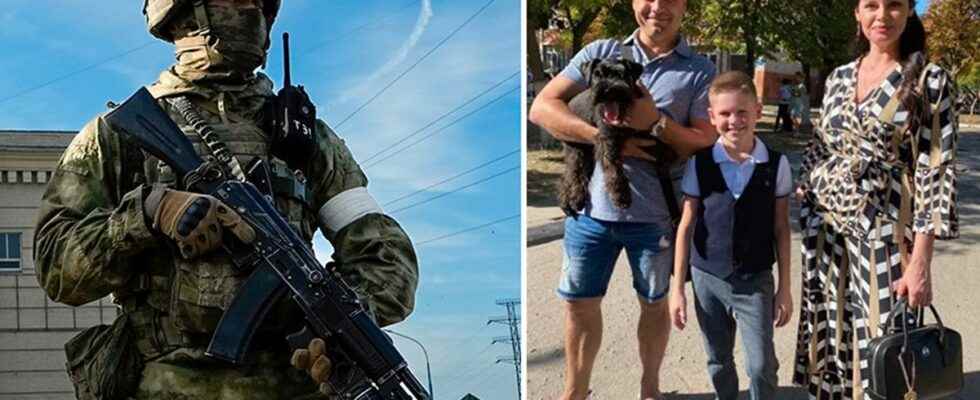Published: Less than 1 hour ago
Updated: Less than 40 min ago
Russian soldiers are running a reign of terror in Kherson.
In May, people still dared to demonstrate against the occupiers. But the protests have died down since more and more residents disappeared or were tortured to death.
Denis Mironov’s body was turned into “a black gloom” by the soldiers’ blows. After 22 days in a prison cell without medical attention, he died.
On March 3, Russia announced that the southern Ukrainian city of Kherson had been captured. For weeks the population demonstrated against the occupiers. They waved Ukrainian flags, jumped onto Russian tanks, stood in front of Z-marked trucks which, to the delight of the people, began to reverse.
At the beginning of May, the protests died down. The crude Russian strategy to quell the resistance was simple but effective: kidnappings, violence and death.
– The Ukrainians in the occupied area are going through hell. The Russian forces have turned it into an abyss of fear and total lawlessness, says Julia Gorbunova of the human rights organization Human Rights Watch.
Over 600 people are missing in the Kherson region after the Russian invasion, abducted by force. How many were tortured and beaten to death is unclear. Every day more Ukrainians are arrested by Russian soldiers.
– Previously they were kidnapped at demonstrations, now they are taken in their homes. The Russians are abducting activists to reduce the resistance of the population, says Nadiya Dobryanska of the human rights center ZMINA to the British BBC.
Several witnesses tell of mass graves in the area, information that has so far not been able to be verified, according to the BBC.
“Total horror, worse than in Butja”
– It is worse than in Butja. An atmosphere of total terror. People are afraid to go out on the street, because they risk being stopped and arrested. So many have disappeared, been tortured and died. People understand that there will be reprisals if they raise the flag or demonstrate, says journalist Diana Kurishko to the BBC’s Russian-language news podcast.
71 Ukrainians from occupied cities such as Kherson, Melitopol, Berdjansk and Skadovsk testify about the situation in a report published on July 22 by Human Rights Watch. The missing and dead are home guards, journalists, police, volunteers who distributed food and sometimes ordinary civilians who were arrested at random.
Two of the dead are Home Guard leaders Denis Mironov, 41, and Vitali Lapchuk, 48, according to the report. They were arrested by Russian FSB agents on March 27 together with home guard Oleh, whose name is faked in the report. Oleh was tortured with electric shocks, but survived and was able to tell how Mironov was stripped and beaten with a rubber mallet.
“He died slowly for 22 days after the torture”
– His body turned into a black mush, says Oleh.
After the torture, Mironov could barely speak.
– We spoon-fed him in the cell. He died slowly over 22 days, without receiving medical attention.
When Oleh was released in a prisoner exchange, Mironov’s body was also sent out, with the numbers 23.04 – the day he died – in green marker on one leg.
The third detainee, Vitali Lapchuk, was taken to the basement of the police station with his wife. She heard her husband being beaten in the next room while Russian soldiers interrogated her:
– They asked if I was a Nazi. I told them that my grandfather was Jewish and that I am Ukrainian. They replied that “there is no such country”.
Then the soldiers claimed that Vitali was “a terrorist”. On May 22, a crayfish fisherman found Vitali dead in a river, with his hands tied. Thanks to his birthmarks, it was possible to identify the mutilated body.
“The bodies were thrown down like garbage”
A woman interviewed by the BBC compares the situation in the area to what it was like in Stalin’s Gulag prison camp. When the woman fled from Kherson, she saw murdered Ukrainians lying between the roadblocks.
– The last straw that made her leave was when she saw from her window how dead Ukrainians were being carried out into a field and laid out in a row. An excavator came and dug a pit. Then the bodies were thrown down, like garbage, says reporter Diana Kurishko in the BBC’s podcast.
The Russian Ministry of Defense has not responded to the BBC’s questions about torture and extrajudicial executions. But Vladimir Putin’s spokesman Dmitry Peskov has previously called the accusations of war crimes in Butja “fake and staged”.
Russia has introduced the Russian ruble as currency in the Kherson region, closed access to Ukrainian internet and forced teachers to follow the Russian curriculum in school teaching.
